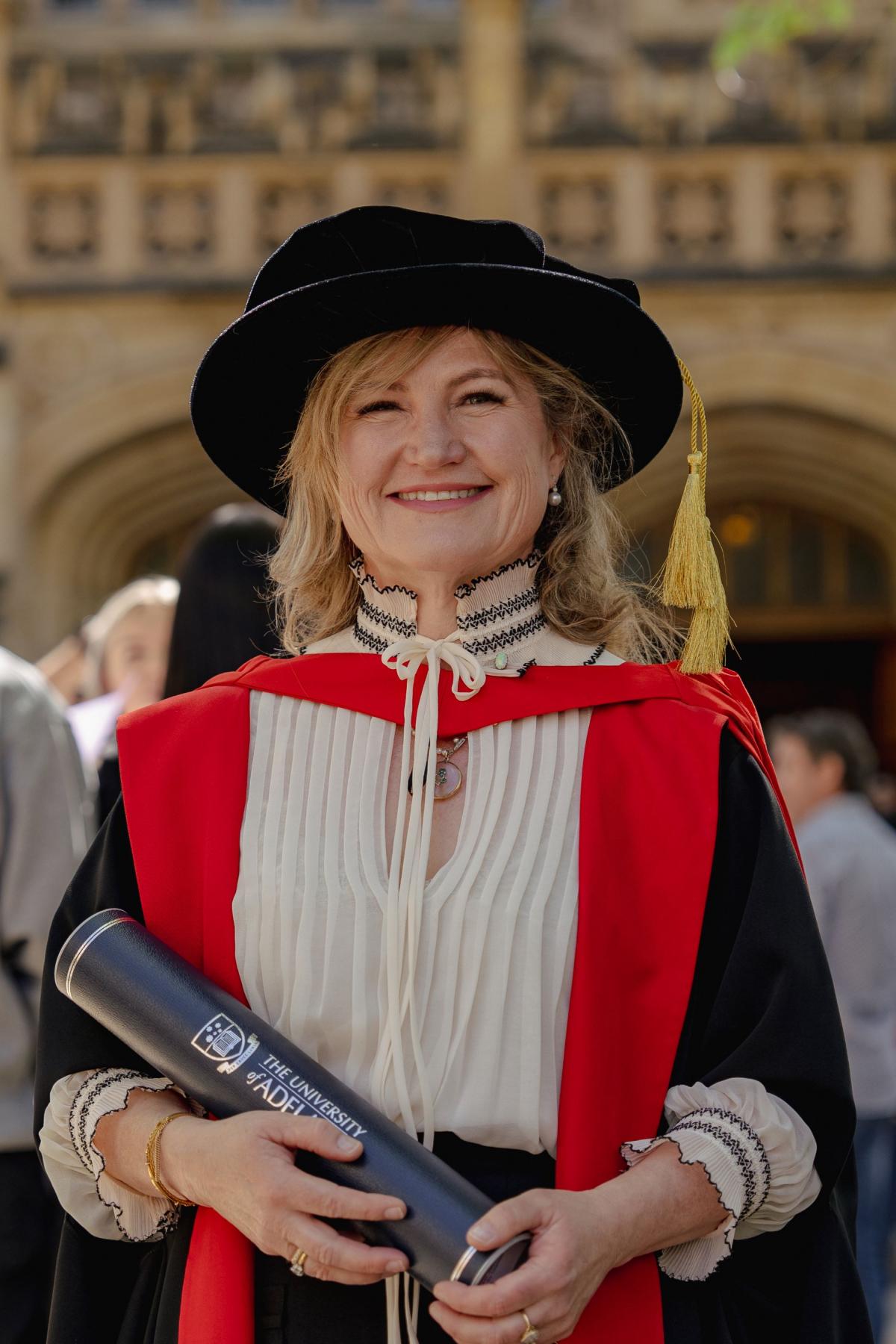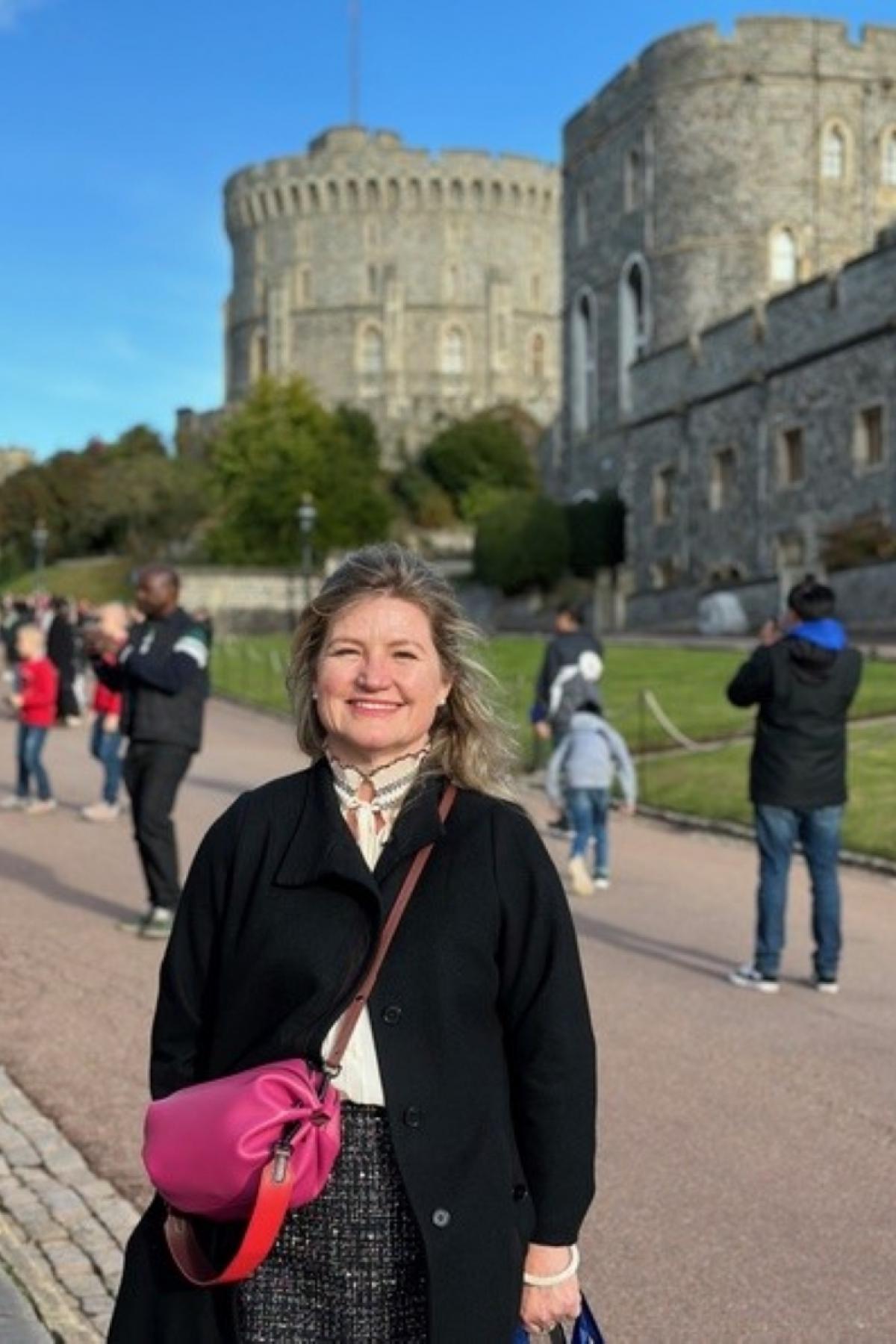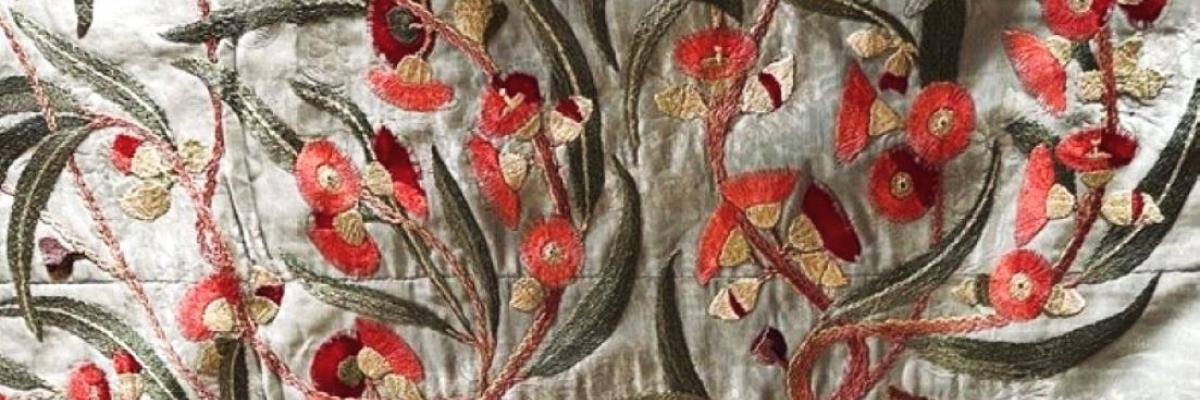Jo Vandepeer
Dr Jodie Vandepeer has been awarded four qualifications from the University in the past three decades. Her recent work has seen her travel to the UK, obtain a special security pass for Windsor Castle and explore behind-the-scenes at the Victoria and Albert Museum, in pursuit of a beautiful artwork with an important untold story. She is now a Visiting Research Fellow at the University.
An experienced teacher and a classical vocalist as well as an art historian and researcher, Jo’s career has been, in her own words, “intrepid”.

“I started a music degree in classical voice [1992] without being able to read music, then a graduate diploma in education [1993] without having taught, a Masters in art history [2018] without any prior knowledge (other than years of gallery tourism), and then a history PhD [2023] without ever studying history at a tertiary level.”
“I keep digging until there is no stone unturned.”Dr Jo Vandepeer
Jo’s central motivation through each new degree is the story. “There is always a story and that is how we connect with others. Every time I research something, I am always amazed at the places it takes me and the people I meet.” In 2017, for example, she found herself sitting at artist Lola Greeno’s kitchen eating Jatz and cheese and recording an interview. More recently she shared a meal at the staff canteen with curators at the Victoria & Albert Museum before heading off to see the incredible objects in their compactors.
She stresses the importance of bringing the story to life in an engaging but rigorous manner underpinned by thorough research. “I keep digging until there is no stone unturned.”
Armed with this enthusiasm for unearthing the history behind objects, Jo began her thesis to explore how Art Needlework was threaded through the history of women’s enfranchisement in South Australia. The years of her doctorate were not without their challenges. Amidst an ongoing global pandemic, Jo faced significant personal struggles. “I worked as a teacher during the day and had to juggle work with study, relationships, a business, mortgage and all the guff that comes with being older,” she recalls.

“During my candidature, I became extremely sick and had four operations, was diagnosed with diabetes… and I had three deaths in my immediate family to cope with.
“Like everyone else, I spent much of my PhD candidature thinking that I was a fraud and not going to pass.”
Fortunately, Jo didn’t let any of it stop her. “I just kept visualising walking onto Bonython Hall stage to receive my testamur,” she recalls.
With this ultimate goal in mind, Jo completed her thesis, which was awarded a Dean’s Commendation and had no revisions – a success that makes Jo “absurdly proud”. After collecting her long-anticipated testamur from the Chancellor, she continued pursuing a story that had been central to her PhD research, travelling to the UK with grant assistance from the University’s Art History and Curatorship Network (AHCAN).
“Like everyone else, I spent much of my PhD candidature thinking that I was a fraud and not going to pass... I just kept visualising walking onto Bonython Hall stage to receive my testamur.”
Her research into the Adelaide School of Design’s Director, Harry Pelling Gill located a striking work of art and important piece of South Australia’s history.
The Royal Collection Trust in the UK has in its collections a significant portiére – a very large, embroidered curtain. The particular example for which Jo travelled across the world is called Portiére 1901. It was commissioned by ‘Women of South Australia’ in 1901 to celebrate Federation.
“It was designed by H P Gill and made by South Australian embroiderers who at the time, enjoyed a national reputation.”
This beautiful South Australian artwork travelled back to Australia in the 1990s, and after being seen and admired at home, it was returned to the UK. When Jo attempted to see the work following her PhD, it was nowhere to be found.
As a result of Jo’s research, Portiére 1901 has been relocated.
Jo describes this work as “strikingly beautiful”. The piece features silk embroidery on blue silk moire and depicts a young gum tree. “There is nothing like it anywhere else,” says Jo.
More than just a beautiful artifact, this work is woven with stories of innovation and social change from South Australia.
“H P Gill was the influential Director of the Adelaide School of Design around the time that women first gained enfranchisement in South Australia. I think it is fair to say that he was responsible for our enduring tradition of valuing the hand-made, bespoke design in this state.”
Being able to once more bring forward the provenance of this special piece of South Australian art is an exceptional outcome of Jo’s ongoing determination to uncover untold stories. Jo is excited that the story of the H P Gill and the portiére continues in the UK. “There is a chance that the Portiére might be exhibited soon at Windsor Castle... I think the ‘Women of South Australia’ who commissioned it back in 1901, not least the designer and needleworkers, would all be chuffed if it was hung on the wall at Windsor over a century later.”
You can hear more from Jo about the fascinating lost-and-found history and cultural significance of the portiére as part of South Australia’s History Festival 2024. She will reveal how this important work became lost, where it spent the intervening years, and how it was tracked down through the combined efforts of Jo and Kathryn Jones, Curator of Decorative Art, Royal Collection Trust.
Adelaide School of Design's Portière A talk by Dr Jo Vandepeer
Thursday 9 May 2024 | 6:00pm
The David Roche Foundation – 241 Melbourne St, North Adelaide
Booking Link: www.rochefoundation.com.au/events/history-festival/

